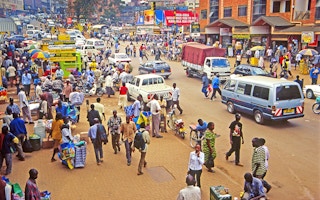Development is spreading in Africa, as can be shown by positive GDP growth exhibited over multiple years across the continent, with bright spots in its North, East, West and Southern quarters.
Initiatives to promote energy such as the New Energy Deal for Africa recently launched here in the African Development Bank, the Africa Renewable Energy Initiative, Sustainable Energy 4 All (SE4ALL) and SEFA and CTF under the Climate Investment Funds are just some of the large scale initiatives promoting various forms of energy across Africa. The recent ECOWAS renewable energy competition hosted by the AfDB showed that there is no shortage of small scale and innovative initiatives being promoted by hungry entrepreneurs.
Africa is thus not standing still. However, our current approach to adaptation tends to assume that everything else remains constant whilst we retrofit existing infrastructure. Hence, farmers need to change to grow crops which are more resistant to drought; we need safety nets for rural communities and vulnerable households; we need to build climate resilient infrastructure, sea defenses and so on. Not to say that we don’t need those things, but at the same time, Africa’s population is growing from a little over 1 billion today to 2 billion by 2050.
We must therefore ask whether what we are building for the coming generations is going to be adapted by design or by retrofit.
Energy supply
The first item we need to address is energy supply.
Energy drives development – and no doubt, Africa needs loads of it. The energy assets we build today will still be operating in 2050 and by then, every nation must have made deep reductions in emissions as we aim for a zero emission global economy by the third quarter – and just to be clear, this is gross zero emission, not net zero.
There will not be any offsets unless someone develops a technology that cost / energy efficiently extracts CO2 from the atmosphere or carbon capture and sequestration becomes spectacularly successful. Planting trees will help but we also need land for food and solar energy.
In other words, we either build adapted energy assets (i.e. renewable) now or we build fossil fuel assets and then try to find ways to mitigate their emissions in the future or adapt to life with them.
Building renewable energy assets is Africa’s biggest adaptation challenge and at the same time, it is Africa’s biggest opportunity.
Education and awareness
The second item we need to massively adapt is education, awareness and the role of the media in building young people’s expectations.
The fact is that without some truly amazing breakthrough technologies, the youth of today cannot expect to live the lifestyle we enjoy today.
Whilst the airline industry for instance is rapidly expanding, the need to cut emissions will soon become a real restraint. Biofuel supply chains are challenging and there is a very big difference between Solar Impulse and commercial airlines.
Until we have widespread (renewable sourced) electric or clean hydrogen vehicles, transport is going to get harder.
It will get harder to produce and transport commodities such as glass, cement and steel.
Red meat, wasted food, air conditioning / central heating, tumble drying clothes are things we will have to have less of.
Waste in general needs to be eliminated as we move to a circular economy.
If we are to achieve our climate targets, life in 2050 is going to have to be very different from today and we need to educate our children to that effect otherwise they are going to be ill-prepared for the world we are creating for them.
Similarly, if we carry on educating our economists, leaders and law makers in the same ways, they will still be struggling over a climate agreement in 2050, unless they’ve all just given up.
The media can also play a huge role in this respect by recognizing just how effectively they can influence trends, fashions and expectations.
Adaptation is a major component of the UNFCCC and sits alongside mitigation, technology transfer and climate finance. Restricting the official definition of adaptation to “adjustments in ecological, social, or economic systems in response to actual or expected climatic stimuli and their effects or impacts” seriously limits the usefulness of this concept.
Adaptation therefore needs to be expanded to have a forward looking aspect which encompasses “Adapted Development” whereby countries adapt their development pathways to grow in a manner which is consistent with the broader sustainable development objectives of the 21st century and which include green and inclusive growth, climate resilient growth and most importantly, low and ultimately zero carbon growth.
Energy and education are possibly the two areas where we most need a paradigm shift in our approach. Renewable energy systems are already adapted to our future needs. Educated and aware citizens are capable of understanding why we need to adapt our lives and at the same time, they are capable of developing their own adaptive strategies.
Gareth Phillips is chief climate and green growth officer at the African Development Bank. The views expressed in this article are the author’s views and not necessarily those of the African Development Bank. This post is republished from Sindicatum Sustainable Resources with permission.


















